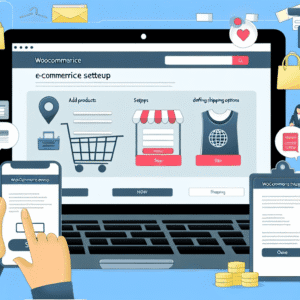Building a Digital Presence: Essential Web Development Strategies for Nigerian SMEs in 2025
In 2025, the digital landscape has transformed the way businesses operate, especially for small and medium enterprises (SMEs) in Nigeria. With Nigeria’s internet penetration hitting new heights, it’s clear that a strong digital presence is no longer optional—it’s a necessity. Whether you’re a retailer in Lagos, an agribusiness in Kaduna, or a tech startup in Abuja, having a tailored web strategy can set you apart from your competition.
Understanding Your Audience
Before diving into the nitty-gritty of web development, let’s talk about the most important aspect of any digital strategy: your audience. Knowing who your customers are and what they want is crucial. In Nigeria, different demographics use the internet differently.
For example, younger audiences are inclined towards social media platforms like TikTok and Instagram, while older generations may prefer Facebook and WhatsApp. Conduct surveys or engage with your customers to gather data. Use the insights to personalize your website content, making it more appealing to your audience.
Choosing the Right Domain and Hosting
The first step in setting up your online presence is selecting a domain name and hosting provider. Your domain name should reflect your business identity. Opt for a .ng TLD (Top-Level Domain) if you want to emphasize your Nigerian roots; this can enhance your local SEO.
When it comes to hosting, consider a provider that offers reliable uptime, speed, and customer support. Nikenga Web Services offers managed hosting solutions, taking the pain out of server management, so you can focus on what you do best—running your business!
Building a Mobile-First Website
In Nigeria, mobile internet usage reigns supreme. According to recent studies, a significant chunk of web traffic comes from mobile devices, so if your website isn’t optimized for mobile, you’re losing potential customers. A mobile-first design ensures that users have a seamless experience, whether they’re browsing on a smartphone or tablet.
Key elements to focus on include:
- Responsive Design: Your website should automatically adjust to fit different screen sizes.
- Fast Loading Times: Optimize images and minimize scripts to ensure your page loads quickly.
- Touch-Friendly Navigation: Make buttons large enough to be easily tapped on a mobile device.
Leveraging Local SEO
If you’re a Nigerian SME, you want your website to pop up when potential customers search for services in your area. This is where local SEO comes in. Optimize your website with local keywords that reflect your services and location—think “fast food in Ibadan” or “digital marketing Abuja.”
Additionally, create a Google My Business listing. This will help you appear in local searches and provide essential information like your business address, phone number, and operating hours. Encourage satisfied customers to leave reviews; they can significantly boost your local search rankings.
Engaging Content is King
Let’s not forget the old adage: content is king. High-quality content engages your audience and establishes your brand as an authority in your niche. In 2025, multimedia content like videos, podcasts, and infographics are gaining traction. Here’s how you can approach content creation:
- Blogs: Start a blog that discusses topics related to your industry. For instance, a fashion retailer could write about style tips, while a tech company might explore the latest trends.
- Social Media Integration: Share your content on various social platforms. Engaging visuals and snippets can draw in more visitors.
- User-Generated Content: Encourage customers to share their experiences with your products or services. This not only showcases your offerings but builds community trust.
Enhancing User Experience (UX)
User experience is crucial for keeping visitors on your site. If your website is confusing or difficult to navigate, you’ll lose potential customers. Here are some UX best practices:
- Simple Navigation: Ensure that your menu is clear and logical. Group similar pages together to help users find what they need quickly.
- Search Functionality: Add a search bar to help users quickly locate specific products or information.
- Clear Call-to-Actions (CTAs): Use strong, actionable language in your CTAs. Whether it’s “Shop Now” or “Get a Quote,” make it clear what you want the user to do.
Security and Compliance
As you build your digital presence, don’t overlook the importance of security. With cyber threats on the rise, having secure socket layer (SSL) certificates is essential. An SSL certificate encrypts the data between the server and your visitors, making transactions safer.
Also, understand the regulations around online businesses in Nigeria, including data protection laws that may affect how you collect and store customer information. Consulting with a legal professional can help ensure compliance.
Social Proof and Testimonials
Potential customers want to feel confident when choosing a service or product. Featuring testimonials from satisfied customers can build trust and credibility. Showcase reviews prominently on your site and share success stories that highlight the real-world benefits of your products or services.
Measurement and Adaptation
Once your website is live, it’s crucial to keep an eye on its performance. Use analytics tools like Google Analytics to track who is visiting your site, what they’re clicking on, and where they’re dropping off. Make it a habit to review this data regularly and adapt your strategy as needed.
FAQs
1. How much should I budget for a website?
Budgeting for a website can vary widely, but as a general rule, you can expect to spend anywhere from ₦50,000 to ₦500,000 depending on your specific needs and the complexity of the site.
2. How long will it take to build my website?
Depending on your requirements, a basic website can be built in a few weeks, while more complex sites may take several months.
3. What if I don’t have any technical skills?
No worries! Many web development companies, including Nikenga Web Services, offer managed solutions to help you every step of the way.
4. How will I know if my website is effective?
Utilize analytics tools to monitor traffic, conversions, and user behavior. Adjust your strategies based on what the data tells you.
5. Why do I need managed hosting?
Managed hosting takes the hassle out of server maintenance, monitoring, and updates, allowing you to focus more on your business.
Final Thoughts
Building a robust digital presence is key to thriving in the competitive landscape of Nigerian SMEs in 2025. From developing a mobile-first website to harnessing local SEO and engaging content, each element plays a crucial role in your success.
Ready to take your digital presence to the next level? Try Nikenga Web Services for managed hosting, marketing, and development. Let’s build something amazing together!






